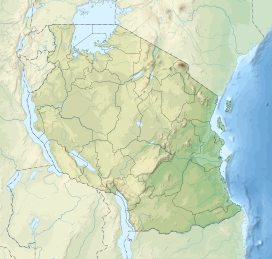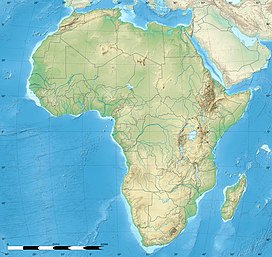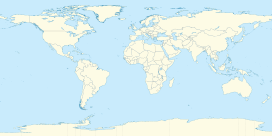Mount Meru (Tanzania)
| Mount Meru | |
|---|---|
 Mount Meru with snow | |
| Highest point | |
| Elevation | 4,562.13 m (14,967.6 ft)[1] |
| Prominence | 3,170 m (10,400 ft)[1] Ranked 72nd |
| Listing | Ultra |
| Coordinates | 3°14′48″S 36°44′54″E / 3.24667°S 36.74833°E[1] |
| Geography | |
| Location | Arusha Region, Tanzania |
| Geology | |
| Mountain type | Stratovolcano |
| Last eruption | October to December 1910[2] |
| Climbing | |
| First ascent | 1904 by Fritz Jäger[3] |
| Easiest route | Hike |
Mount Meru is a dormant stratovolcano located 70 kilometres (43 mi) west of Kilimanjaro in southeast Arusha Region, Tanzania. At a height of 4,562.13 metres (14,968 ft),[1][4] it is visible from Mount Kilimanjaro on a clear day,[5] and is the fifth-highest of the highest mountain peaks of Africa, dependent on definition.
Mount Meru is located just north of the city of Arusha, in the Arusha Region of Tanzania. It is the second-highest mountain in Tanzania, after Mount Kilimanjaro. Mount Meru is also the highest mountain/point in Arusha Region. The Momella route – which starts at Momella gate, on the eastern side of the mountain – is used to climb Mount Meru.[6]
Mount Meru's lavas are alkaline in character and include nephelinite.[7] Much of the mountain's height was lost about 7,800 years ago due to a summit collapse.[8] Mount Meru most recently had a minor eruption in 1910.[2] The several small cones and craters seen in the vicinity probably reflect numerous episodes of volcanic activity. Mount Meru's caldera is 2.2 miles (3.5 km) wide.[9]
Mount Meru is the topographic centerpiece of Arusha National Park. Its fertile slopes rise above the surrounding savanna and support a forest that hosts diverse wildlife, including nearly 400 species of birds, and also monkeys and leopards.
The movie Hatari! was filmed at the foot of Mountain Meru.
See also
[edit]References
[edit]- ^ a b c d Africa Ultra-Prominences Peaklist.org. Retrieved 2011-11-22.
- ^ a b "Meru". Global Volcanism Program. Smithsonian Institution.
- ^ Mount Meru at SummitPost.org
- ^ "Mount Meru, Tanzania". Peakbagger.com. Retrieved 2014-08-27.
- ^ "A view of Mount Meru from Mount Kilimanjaro". Archived from the original on 2013-01-26. Retrieved 2008-05-03.
- ^ Tanzania travel guide (6 ed.). Lonely Planet. June 2015. p. 168. ISBN 978-1742207797.
- ^ WILKINSON, P, MITCHELL, J G, CATTERMOLE, P J and DOWNIE, C. 1986. Volcanic chronology of the Meru-Kilimanjaro region, Northern Tanzania. Journal of the Geological Society, London 143, 601–605.
- ^ "Glocal Volcanism Program - Meru". Retrieved 24 May 2019.
- ^ "Meru, Tanzania". Retrieved 24 September 2018.
External links
[edit]- "Mount Meru". Peakware.com. Archived from the original on 2016-03-04.
- Mount Meru Climb Information
- Satellite pictures of Mount Meru
- trekkingvisions Information about the Mount Meru Trek



